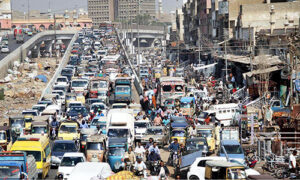
About a couple of weeks ago, as I was driving to the City Campus of the Institute of Business Administration (IBA) Karachi for a lecture, I had to navigate through overflowing sewage on Garden Road, M.A. Jinnah Road and lanes off both roads to get to my destination. Once there, I was struck by the contrast between it and the paths to it — stark and distressing. At one end, an institution of excellence born in Karachi about 60 years ago, founded with the benevolent aid of the USA through the Wharton School of Business, University of Pennsylvania. And from its very inception and through the successive next 50 years, under directors with varying personalities, the IBA maintained its steady, stable course of survival, growth and consistency. When the American presence concluded, the IBA’s purely Pakistani credentials came quickly to the fore and it became entirely indigenous. At the other end, the manifestations of overflowing gutters and under-performing urban services.
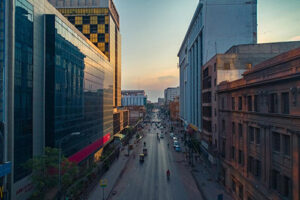
While retaining its almost original location on and off M.A. Jinnah Road, IBA became a tenant of the University of Karachi at the latter’s new Campus onward of the 1960s. With an expansion of faculties, enrolment and courses, IBA Karachi also initiated and enabled IBA Sukkur to take shape and become so successful and autonomous an entity in its own right that today IBA Sukkur has achieved its own higher education status without formal ties to its Karachi genesis.
Educating and nurturing thousands of youth for over 50 years, IBA has produced, and continues to produce today cadres of capable young technocrats. They have infused qualitative improvements in Business Management, Accounting, Information Technology, Entrepreneurial Innovation and Human Resource Development. They primarily benefit the private sector, but some also manage to survive the travails of the public sector. Equally notably, IBA graduates have achieved recognition in highly-competitive international arenas in the Middle East, U.K., USA and South East Asia. Even after the advent of the Lahore University of Management Sciences onwards of the 1970s and the end of IBA’s virtual monopoly, IBA Karachi continues to be a centre-of-excellence.
This achievement is made all the more remarkable because IBA is a thoroughly public sector institution, not a profit-seeking private educational enterprise. So distinct is IBA’s performance that it has always remained markedly different from its immediate neighbour, the University of Karachi (UoK), my own alma mater. Though the UoK has the largest enrolment of a single-campus university in the country, today in 2021 with the exception of two or three departments, the UoK has declined in several respects.
One vivid indicator of the difference between IBA and UoK — both public sector institutions — is the fact that a few years ago, when there were frequent episodes of violence, strikes, disruption of classes etc. at the UoK Campus just a few hundred yards away from the IBA Campus, classes, attendance and discipline within IBA continued without a break. Throughout its existence, perhaps the principle of zero-tolerance for disruption of studies and complete disregard for external or political interference in the academic realm has distinguished IBA from what UoK was often subjected to in past years.

For the record: there has been some fortunate improvement in the UoK’s conditions in recent years, but the IBA is way ahead of its neighbour.
Both entities of the public sector have evolved in Karachi where, in 2021, the metropolis represents a profound example of sharp dualities. These dualities comprise, on the one hand, sophisticated, corporate management in the private sector juxtaposed with rudimentary failures of governance in the public sector. Major multinational corporations create and maintain workplaces of exemplary hygiene and controlled environments, while a few hundred feet away, well-staffed municipal services and other official agencies are unable or unwilling to perform even basic duties of sewage management, garbage collection and road repair. Is it possible that one of the reasons for such dramatic contrasts in Karachi is the absence of education and training institutions that prepare individuals for efficient public administration equivalent to the efficiency of institutions for business administration?
To be fair to the public sector in Karachi, in historical terms as well as in more limited contemporary terms, the public sector of what is now Pakistan’s largest city has shown extraordinary capacity to cope with crises, emergencies and formidable challenges. For about the first 25 or 30 years of post-1947 Karachi, the city’s public sector was able to handle the huge influx of migrants immediately after Independence, and to meet essential needs of water supply, electricity, food, transport, housing, et.al.
Whether it was the legendary trams that connected different parts of the metropolis, or whether it was the equally legendary Lt. General Azam Khan, who led the phenomenally rapid construction of Korangi in the early 1960s, whether it was the ability to attract thousands of western tourists to hotels and nightclubs in the 1950s and 1960s, or whether it was the speed and ease with which kutchi abadis could spring up overnight — ignoring the breaking of laws — Karachi was somehow able to cope in a critical phase of history.
But even as conditions of governance steadily declined onwards of the 1970s, some public sector institutions — perhaps only a handful but nevertheless real — proved that the city has the potential to support standards of probity, reliability and safety. For instance, in one sphere, the State Bank of Pakistan with its permanent Head Office in Karachi and staff of thousands drawn from across the city, and the country, remains a fine example of a public sector institution that fulfils its obligations to the public interest with reliability and credibility. One can dispute its fixing of the interest rate or its occasional laxity in supervising private banks, but in overall terms the State Bank is also an institution of excellence in Karachi.
In an entirely different sphere, the Karachi Nuclear Power Plant (KANUPP) of the Pakistan Atomic Energy Commission (PAEC), charged with the production of energy while using an extremely complex and hypersensitive technology, has maintained an outstanding record of safety and compliance with globally-recognised standards.
In the crucially important sector of public health-care, every resident of Karachi can legitimately claim to be part of a city that is a world leader in compassion, philanthropy and professional excellence. Perhaps aptly, one of them is in the domain of the Government of Sindh — though the individual spearheading the achievement is a veritable institution in himself. The Sindh Institute of Urology and Transplantation (SIUT) founded and selflessly led by Dr. Adeeb Rizvi as part of the Civil Hospital Complex off M.A. Jinnah Road has carved out a special niche of accomplishment for Karachi, and has also spawned numerous units across the province.
The other phenomenal but far less-acknowledged institutions are in the domain of the federal government, but also receive support from the Government of Sindh. These include the Jinnah Post-Graduate Medical Centre (JPMC) and its adjacent institutions, such as the National Institute for Cardiovascular Medicine. Providing direly-needed attention to thousands of patients every day drawn from all parts of the city and from the province, the JPMC-complex, led with energetic commitment by Dr. Seemi Jamali, is also home to a less-known but a truly incredible achievement by Karachi and some of its dedicated citizens. Whenever I visit the Radiology Department to meet its soft-spoken, exceptionally capable Head Dr. Tariq Mehmood and where I sometimes encounter the admirably-dedicated volunteer citizen Mushtaq Chhapra, my heart fills with immense pride when I read the plaque on the façade: “The only free cyberknife facility on the planet.” Treatment without any charge is available to any person regardless of nationality, religion or ethnicity. Costing about $4.1 million each, (there are two in Karachi), the cyberknife facility is the outcome of a purposeful public-private partnership between the citizen-led Patients’ Aid Foundation and the Government of Sindh, with full endorsement by the federal government. The cyberknife is one of the most advanced forms of treatment for cancer because, using robotic radio surgery, it minimises tissue damage compared to conventional surgical procedures. Whereas in every other country of the world where a cyberknife facility is available, the terms and conditions require that the free service will only be available to citizens of that particular country or services will be provided against a payable fee, it is only at JPMC Karachi that this advanced health therapy is made available to any human being who needs it.
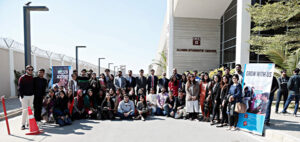
Along with the cyberknife facility, the Radiology Department and the newly-constructed surgical block next door testify to the superb collaboration between generous private donors, the Government of Sindh and the federal government. Such examples are relatively few, but they nevertheless exist in the very same city where other public sector institutions have failed so visibly.
The police service is possibly and unfortunately the least likely service to be rated as being either professional or capable or reliable. There is certainly evidence to justify widespread public discontent with the police on various grounds. However, we need to remember and to laud the very large numbers of police ranks at multiple levels who have given the ultimate sacrifice of their lives, or have suffered life-changing disabilities during their act of rendering support to citizens and to the enforcement of law and order. In the 1990s and in the first decade of the 21st century, dozens of Station House Officers (SHOs) were murdered in target killings conducted as acts of revenge by elements aligned with criminals or terrorists who were arrested, or were subjected to custodial killings in special operations. Those who ordered the SHOs and their other police comrades to carry out preventive actions against the tidal wave of criminality to which Karachi was subjected in the 1980s and 1990s did not have to suffer the kind of irredeemable losses that the families of policemen continue to face years after their men perished in the service of the city.
Unlike the clarity and continuity of the organisational framework within which IBA operates, an open, forever growing Karachi has had to suffer the worst consequences of multiple jurisdictions over its land and its administration. These include: KMC, KDA, Housing Societies, the railways, army, navy, air force, KPT, Cantonment Boards, Government of Sindh, Government of Pakistan and the equally multiple levels of the respective bureaucratic structures. Karachi has also had to pay the price — while also contributing to it — of the comparatively slow reduction in the national rate of population growth. Through continuous migration from all other parts of the country, through indigenous replication by those already settled in the city and by the influx of non-Pakistani refugees and immigrants as well, Karachi has become both a microcosm of the nation as well as a macrocosm of skills, talents, beautiful diversities of dialects, ethnicities and lifestyles. Even as we validly complain and protest about the failure of virtually all political parties to conduct an authentic devolution of power to the grassroots levels, we need to acknowledge that this enormous, ramshackle megalopolis of over 20 million people somehow manages to survive and throb and grow and produce and contribute significantly to the pulsating life and mystery of Pakistan. Because, despite water tankers which are as full of corruption as they are of liquid content, there are institutions and individuals in the public sector of Karachi that are capable of excellence while others are also, alas, capable of excesses of another kind, and apparently unlimited ones! To resolve this dichotomy, each citizen has to pitch in, not just through grievance and complaint, but with an active contribution, however modest but continuous, to help this inimitable city become a better place.
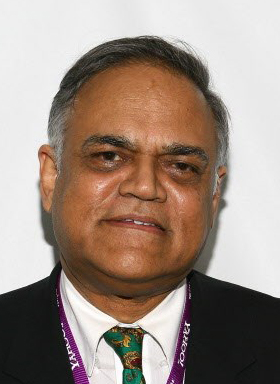
The writer is a former information minister. He is a renowned filmmaker and intellectual, having authored several books and directed three movies.



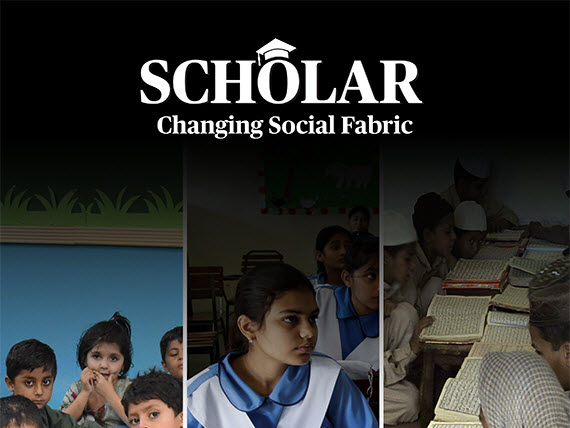
Definition of *Active Contrbution* ….sums up to suub chalets hai yeah chai pani kharcha.
Thanks for writing about my city, warts and all/
TK
You have beautifully summed up the story of a declining and rising Pakistan. The transformation is taking place but it is painfully slow. We will get there. We perhaps need to create a Development Practice Institute like IBA. Can you take the lead?